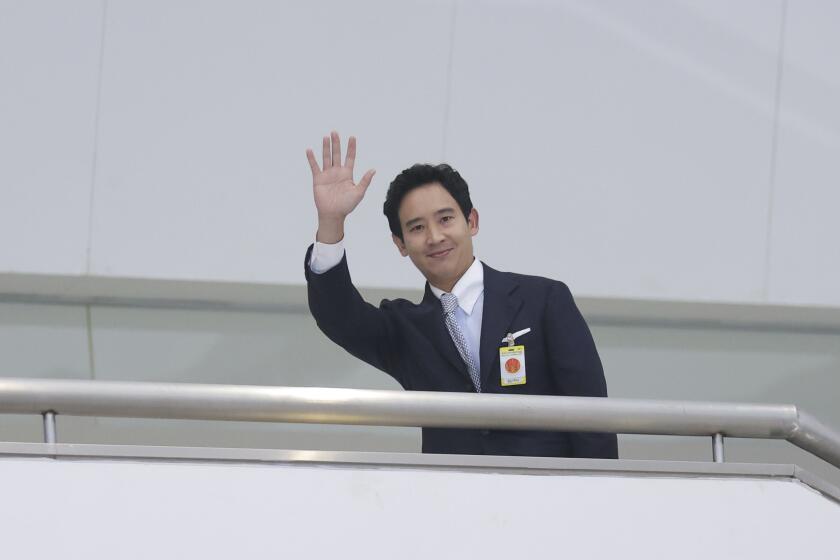Thai Prime Minister Srettha removed from office by a court order

- Share via
BANGKOK — A court in Thailand on Wednesday removed Prime Minister Srettha Thavisin from office over an ethical violation, further shaking up Thai politics after it ordered the dissolution of the main opposition party a week ago.
The Constitutional Court ruled on a case involving Srettha’s appointment of a Cabinet member who had been jailed in connection with an alleged attempt to bribe a court official. The ruling removed Srettha from office immediately.
The Cabinet will remain in place on a caretaker basis until parliament approves a new prime minister. A vote was scheduled by parliament Friday, but it has no time limit for filling the position. The caretaker Cabinet could also dissolve parliament and call a new election.
“I’m sorry that I’d be considered as a prime minister who’s unethical, but I’d like to insist that I believe that is not who I am,” Srettha said shortly after the verdict, thanking the judges for giving him the opportunity to defend himself.
The acting prime minister is expected to be Phumtham Wechayachai of Srettha’s Pheu Thai party. Phumtham was first deputy prime minister and commerce minister under Srettha.
A court in Thailand ordered the dissolution of the Move Forward Party, which won 2023 national elections, over a proposal to amend a law against defaming the royal family.
The Constitutional Court last week ordered the dissolution of the progressive Move Forward Party, which won last year’s general election, over an accusation that it violated the Constitution by proposing an amendment to a law against defaming the country’s royal family. The party has already regrouped as the People’s Party.
The petition against Srettha was initiated by former members of the military-installed Senate who had refused to approve Move Forward’s prime ministerial candidate when the party was attempting to form a government after its election victory. It was seen as a move favoring a pro-military political party in his coalition government.
Two years ago Thailand became the first country in Asia to decriminalize marijuana. As in California, it hasn’t worked out as planned.
Thailand’s courts are considered a bulwark of the country’s royalist establishment, which has used them and nominally independent state agencies such as the Election Commission to issue rulings to cripple or sink political opponents.
The Constitutional Court’s rulings are “two judicial coups” that are “against international standards and upset the usual checks and balances in a democratic system,” said Prajak Kongkirati, a political scientist at Bangkok’s Thammasat University.
“It shows that Thailand currently is not a democracy and that the 2017 Constitution handed the judiciary and the independent organizations unbalanced power,” he said, a reference to Thailand’s current Constitution, which was sponsored by the military government that staged a coup in 2014.
Srettha became prime minister in August last year, despite his Pheu Thai party finishing second in the general election. After Move Forward was denied power by the Senate, whose term ended in May, Pheu Thai — then the biggest coalition partner of Move Forward — excluded it from the coalition and joined with parties affiliated with the previous military-controlled government to gather enough support to approve a new prime minister.
Srettha, 62, a real estate executive before entering politics, prioritized opening up Thailand after almost a decade of military-backed rule, frequently traveling abroad for trade negotiations.
Saksornchai writes for the Associated Press. AP writer Napat Kongsawad contributed to this report.
More to Read
Sign up for Essential California
The most important California stories and recommendations in your inbox every morning.
You may occasionally receive promotional content from the Los Angeles Times.















